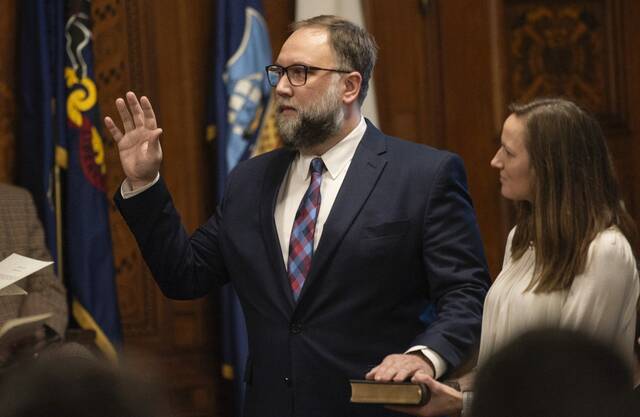https://triblive.com/local/pittsburgh-councilman-questions-why-gainey-administration-passed-over-some-groups-for-anti-violence-funds/
Pittsburgh councilman questions why Gainey administration passed over some groups for anti-violence funds

A Pittsburgh councilman is upset that some community groups are being bypassed for city grants to fund anti-violence programs in favor of others he says might be less deserving.
Councilman Bobby Wilson, D-North Side, is blaming the Gainey administration for what he views as an opaque award system that doesn’t follow its own rules in distributing nearly $2 million in grants.
Wilson claims city officials are not abiding by their own scoring system that ranks applicants, meaning it’s anybody’s guess why some groups get money and others don’t.
Of 61 eligible applicants this year, 39 are set to receive money.
Three of the top 20 scorers are not expected to receive funding.
Meanwhile, nine of the 20 applicants that scored the lowest are slated to get money.
Marissa Escajeda, CEO of Girls Inc. of Greater Pittsburgh, said she learned her organization won’t received funding through the Stop the Violence program — even though the nonprofit ranked No. 2 on the city’s scorecard.
Escajeda said the group will continue to seek funding from other sources.
The Women’s Center & Shelter of Greater Pittsburgh, was also not chosen to get money. It ranked eleventh on the scoring list — ahead of 30 other groups that are poised to receive grants.
If officials make decisions based on factors beyond a standardized scoring scale, Wilson said, the public should get some explanation for how those decisions were made.
“We have good evidence or record-keeping of the scoring system,” Wilson said. “And then when we move away from that, we don’t have a good record of that. We don’t have any record of that.”
During a City Council meeting on Wednesday, Public Safety Director Lee Schmidt agreed the scoring system may need to be updated.
Council is expected to take a final vote Tuesday on issuing the grants, which total about $1.7 million.
Felicity Williams, who serves as Pittsburgh Mayor Ed Gainey’s deputy chief of staff, said the scores are a “valuable benchmark,” but final decisions also consider groups’ community impacts, each applicant’s capacity to reduce gun violence, how organizations are distributed around the city and groups’ working relationships with the city.
Other factors include the number of people who could benefit from the grant, Williams said, and how much funding would go directly to community services rather than salaries.
Williams said the scoring system sometimes gives higher scores to applicants that have “stronger writing skills,” even if other groups “perform better in practice.”
Terri Minor-Spencer, founder and president of West End POWER, said she feels her organization does good work, but they’re not as focused on penning perfect applications and can’t afford to hire professional grant writers.
The group is set to receive money from the Stop the Violence program this year — though Minor-Spencer initially got an erroneous email from the city informing her the group would not get funding.
“I’m extremely grateful, but I also know that the work we do in our community — all of us — is priceless,” she said. “You can’t put a price on saving a life.”
Nicole Molinaro, president of the Women’s Center & Shelter said she had not heard any feedback from the city about the grant application.
“It’s unfortunate we were not funded,” Molinaro said. “I don’t know why that is. I would love a discussion with somebody about that.”
The grant would have been used to finance a program that supports child victims of domestic violence.
“The idea is if we stop the violence at an early age, if we help child victims of violence, then they will not grow up to use violence themselves,” Molinaro said.
Wilson requested additional information about who made decisions about funding groups with lower scores, the specific reasons each of group was chosen over higher-ranking applicants, what non-scoring factors were considered and whether that approach was applied consistently.
Stop the Violence Coordinator Ian Reynolds said such decisions are made on a “case-by-case basis.”
Copyright ©2026— Trib Total Media, LLC (TribLIVE.com)
